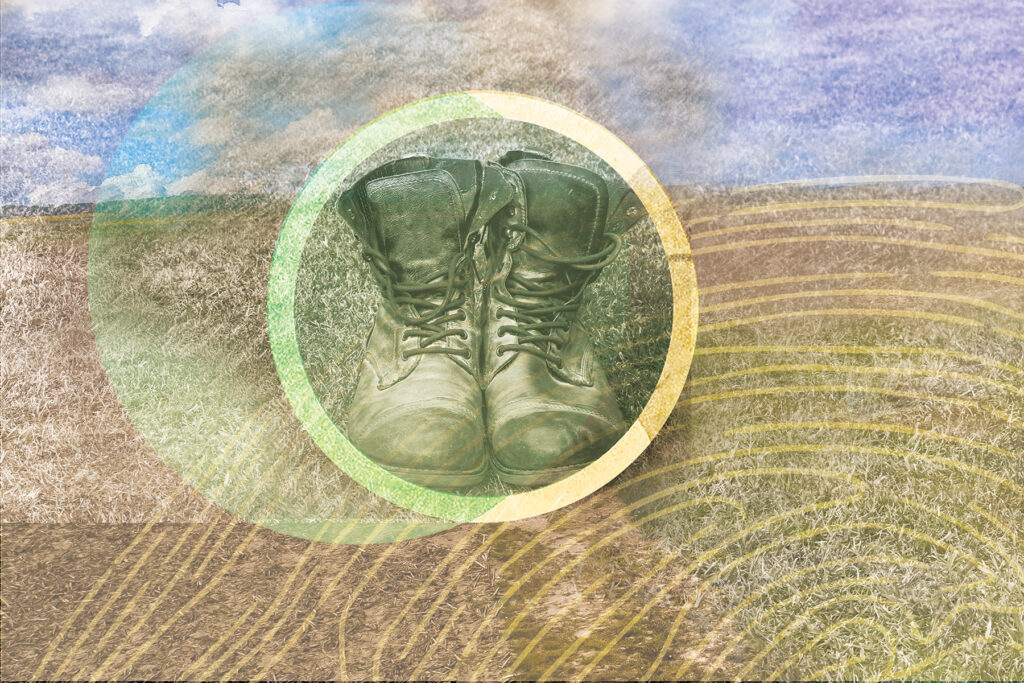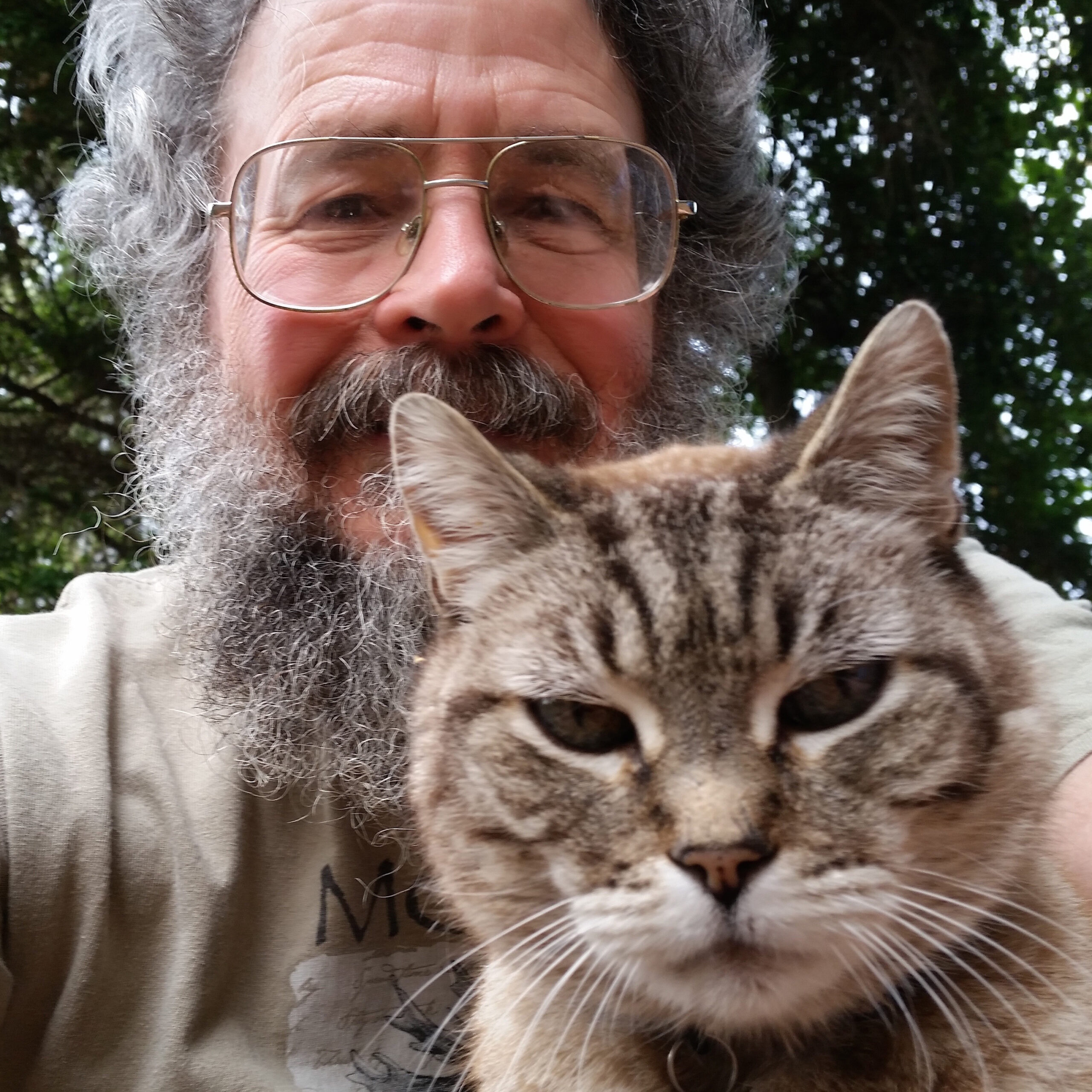This is a story that happened a long time ago . . . or maybe not so long ago.
There was a hermit named Simon who lived in the desert, spending his days and nights intensely meditating on the nature of God. At first, he thought he was making progress. But, after years alone on a desert mountaintop, the moments of enlightenment grew fewer, the hours of sterile drowsing longer, until Simon decided to seek guidance from someone wiser than himself.
Simon left his hut in the desert and walked down out of the mountains. He came through a pass into a broad valley where two armies had battled to the death not long before. Everywhere there were torn banners and smashed chariots, broken spears and fallen barricades. Everywhere there were dead soldiers, lying quietly together, even though in life they had pierced each other with swords. Crows circled overhead, but on the battlefield nothing moved except a single figure standing in the center of the carnage.
Simon approached the standing man, who was clothed in a robe of shining white and did not so much walk on the ground as float above it. Although difficult to see, he seemed to be supported by great golden wings that spread above his back. Simon was somewhat peeved: for all his prayers in the desert, he had never been granted a vision of an angel, and now he came upon one in this evil place.
“What are you doing here?” Simon asked.
Sweeping his arm over the legions of dead, the angel replied, “I am here to guide these souls to heaven.”
“Have you any guidance for me?” asked Simon.
“More than that, I have a task for you,” said the angel. He stooped and took off the boots of a soldier lying face-down on the ground at their feet. “Take these and give them to this man’s family. Guidance will come to you as you do this.”

Taking the boots, Simon believed that this should not be too hard a task. He set off down the road out of the valley toward the nearest town. In the center of town was a well, from which a young woman was drawing water.
“Do you know whose boots these are?” asked Simon. “They belonged to a man who died in battle, and I am to return them to his family.”
“I do not recognize them. My sons are only children, too young to join the army,” replied the woman. After Simon went on his way, she said to herself, “I never want my sons’ empty boots brought to me after they die in battle. I will try to teach them another way.”
In the next town, Simon met a young man. “Do you know whose boots these are?” he asked.
“My brother is in the army, but these are not his boots,” answered the young man. After Simon left, the young man said to himself, “I never want my brother’s empty boots brought to me after he dies in battle. Nor do I want my own boots brought to my mother. I will try to learn another way.”
On the way to the next town, Simon met an old man herding goats. “Do you know whose boots these are?” he asked. “They belonged to a man who died in battle, and I am to return them to his family.”
“My son was in the army long ago, but he survived and is now a farmer,” answered the old man. And after Simon left, the old man said to himself, “I never want my grandson’s empty boots brought to me after he dies in battle. I wonder if we can learn another way.”
Simon carried the empty boots to town after town, but in none did he find the family of the dead soldier so he could return them. The road Simon traveled led north into Persia, then west to Greece and Macedonia. He went to Carthage and to Rome, and from there to the steppes of Asia. He traveled throughout Europe, stopping many times at towns in Austria, France, and Germany. He went to the New World, and asked townsfolk in Shiloh and Gettysburg if they knew whose boots these were. He crossed another sea, and showed the empty boots to people in China and Korea, Vietnam and Cambodia. Finally, he has come back near where he started, and still he has not found a family to claim the boots he carries.
Wherever he goes, Simon asks, “Do you know whose boots these are?” No one answers yes, but after he has gone, the mothers and brothers and grandfathers always wonder, “Can we learn another way?”
Simon’s task is taking longer than he thought; still, he knows he is on the right path. He is given guidance: every so often, he hears the beat of golden wings behind his back. But when Simon turns to face the angel following him, nobody is there.





I haven’t watched TV news in years. I do have an online subscription to the NYT, but mostly read the articles with a cultural, archeological or wildlife focus. Today, for some reason, I delved more deeply into political subjects. Finally closing the Times, I saw myself dribbling into depression. But next I clicked on the FJ email and read Eric Saberman’s “Empty Boots.” Thank you thank you, both to FJ and Eric. My spirits and commitment to Peace have been lifted up and renewed.B
The metaphor of a soldier’s empty boots was inspired by AFSC’s “Eyes Wide Open” exhibit opposing the Iraq War , which I learned of shortly before writing the story. In May, 2008, I was involved in bringing “Eyes Wide Open” to Stanford University. A Quaker graduate student, Daniel Steinbock, took pictures of this installation and posted them on Flickr:
In the story, Simon inspires people to try “another way,” a phrase that stands for every kind of peacemaking you can think of.
A wonderful piece that has left me in great dilema wonderingthe end of the empty boots?
This story brings to mind the “The Two Cats of Kilkenny” limerick. So many present-day wars have ended in negotiations, albeit after a lot of suffering, many casualties, and tremendous devastation. Pacifism can stop wars by denying them soldiers, and friendly persuasion can peacefully resolve conflicts before they escalate.
THERE ONCE WERE TWO CATS OF KILKENNY
There once were two cats of Kilkenny,
Each thought there was one cat too many,
So they fought and they fit,
And they scratched and they bit,
Till, excepting their nails
And the tips of their tails,
Instead of two cats, there weren’t any.